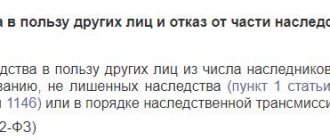Home / Family law / Inheritance
Back
Published: 08/14/2018
Reading time: 10 min
2
197
The procedure for registering an inheritance, depending on its composition, may include various steps. The presence of expensive property (vehicles or real estate) in the inheritance often requires an assessment of the value of such property.
- Why is the assessment carried out?
- Types of assessment
- Assessment procedure
The cost and procedure for the assessment procedure depends on the type of inherited property and the method of assessment.
Why do you need a property valuation?
Property valuation is carried out, first of all, to calculate the amount of state duty. This is payable to the notary who is handling the inheritance case and issuing a certificate of rights to it. It follows that the procedure is considered mandatory and is required in any case, regardless of the presence or absence of a will.
In certain situations, when the heirs are not able to come to a common decision regarding the fair division of the property of a deceased relative, the results of the assessment will also be useful. An expert's opinion will help resolve numerous disputes. And in general, most successors want to know what the total value of the inherited estate is.
In this case, most often the question of valuation arises when there are many heirs, and the property includes a large number of items and really has a significant value.
If books, dishes, furniture and other small things are offered as an inheritance, then there is no need for this procedure, partly due to the fact that no one turns to a notary in such cases. This means no duty payment is required.
Why is an apartment appraised by a notary?
Price per square meter is a market concept and unstable. It would be simply stupid to equate one property in price to another. The most important component of a property's value is its location.
The price in different areas will vary significantly. In addition to this factor, the determination of the price is influenced by the technical condition of the housing, its design, availability of repairs, area, and the existing infrastructure in the presented area.
When determining the cost of housing, documentation is issued that confirms the price of the property on the date of the procedure and contains detailed information about the assessed property.
This procedure is necessary when performing any legal actions, namely:
- when buying, selling or donating housing;
- when registering an inheritance or its share;
- when registering a marriage contract;
- in case of disputes regarding the division of property (during divorce);
- for mortgage lending;
- upon transfer of collateral;
- for home insurance.
What is subject to assessment
Legislatively, the following objects are subject to the property valuation procedure:
- real estate, both residential and empty;
- motor vehicles;
- equipment, machinery;
- weapons, ammunition;
- intellectual property law and copyright;
- securities;
- the deceased's business or his share in it.
Other valuables are also subject to assessment, for example, objects of art, jewelry, etc.
Valuation of inheritance: essence, objects of valuation
Before entering into the right of inheritance and receiving the property left by the testator, the heir must understand how beneficial it will be to accept this inheritance. Often, receiving an inheritance results in large financial costs for the heir, which he did not expect. So why do you need an inheritance appraisal?
- If there are several heirs, then the assessment of the inheritance will help the heirs determine what portion of the money will go to each of them.
- Transfer of the received assessment to the notary. Based on the assessment received, the notary will draw up the necessary documents to enter into the right of inheritance, and after some time the heir will receive the appropriate certificate of entry into the right of ownership;
- Knowing the exact value of the inheritance left will help determine the amount of the state fee that will have to be paid when issuing a certificate of entry into the right of inheritance;
Read about how to evaluate a car for inheritance here.
You can obtain an estimate of the value of abandoned movable and immovable property for the following types of property:
- Real estate (apartment, private house, cottage);
- Plot of land;
- Structures, buildings for commercial and other purposes;
- Motor vehicles;
- Securities, assets, shares;
- Shares in commercial organizations;
- Other inheritance objects;
To learn how and where to obtain an assessment of movable or immovable property left by inheritance (in this article we will talk about an apartment), read in the next section.
Types of assessment
The assessment of the estate can be made taking into account the following types of value:
- Cadastral . Used to evaluate real estate and land. The information is contained in the Cadastral Chamber, where you can send a request.
- Inventory . This is carried out by contacting the Bureau of Technical Inventory (BTI) at the location of the inheritance. This type of assessment is used extremely rarely due to the small number of criteria by which the expert determines the value.
- Market . The most adequate type of assessment, based on the real value of the property at which it can be sold or purchased at a particular moment. In this case, most factors influencing the amount are taken into account.
Despite the fact that some types of assessment are not considered optimal, the successor has the right to present a deed with the results of any of them to the notary. At the same time, the employee of the notary office does not have the opportunity to reject the document. As well as requiring the preparation of an expert opinion of a certain type.
If the heir provides the notary with the results of several types of assessment, the state duty is calculated based on the smaller amount indicated in the documents.
What documents confirm the value of the inheritance?
The responsibility to evaluate the property upon entering into inheritance lies with the heir. At the same time, he can choose between different types of assessment (subclause 5, clause 1, article 333.25 of the Tax Code of the Russian Federation):
- inventory;
- cadastral;
- market;
- other (nominal).
All these types of assessment must be unconditionally accepted by the notary. He has no right to insist on a different method of assessment and on this basis refuse to issue a certificate of inheritance.
If the notary still refuses to issue a certificate, his refusal can be challenged in court (for the procedure for challenging, see Chapter 37 of the Code of Civil Procedure of the Russian Federation). Usually, in such cases, the courts take the side of the heir if he proves that he actually submitted all the documents to the notary and was refused (appeal ruling of the Moscow City Court dated November 8, 2017 in case No. 33-39584/2017).
If you present several documents at once, then to calculate the amount of the state fee, the notary must take the lower cost.
At the same time, it must be remembered that for some types of property not every valuation method can be used. We will cover this issue in more detail below.
Each type of assessment involves submitting to the notary a specific document containing data on the value of the property.
Market price
Market valuation of inheritance for a notary is carried out by organizations and individual entrepreneurs-appraisers in accordance with the Law “On Valuation Activities in the Russian Federation” dated July 29, 1998 No. 135-FZ (hereinafter referred to as Law No. 135-FZ). The market valuation, in addition to the characteristics of the object itself (size, location, condition, etc.), also takes into account the demand for this property on the market, that is, in fact, this is the price for which the object can be sold (paragraph 2, article 3 of Law No. 135-FZ).
You can find more complete information on the topic in ConsultantPlus. Full and free access to the system for 2 days.
The document containing information about the assessment is in this case only the assessment report in paper and (or) electronic form (Article 11 of Law No. 135-FZ). It contains the following information:
- description of the object with all characteristics;
- data on which the assessment is based;
- the result of the assessment is the value of the property.
Note! Acts, certificates and other documents, except for the report, issued by a professional appraiser will not be accepted by a notary.
Cadastral value
The cadastral value applies only to real estate objects and land plots (subclause 8, clause 1, article 333.25 of the Tax Code of the Russian Federation).
It is the result of a state cadastral assessment carried out by the Federal Service for Registration, Cadastre and Cartography. Information about such an assessment is issued in the form of an extract from the Unified State Register indicating the value of the property.
The cadastral value available in Rosreestr will be relevant on the date of opening of the inheritance, since revaluation is carried out at the regional level every few years.
You can obtain an extract from the Unified State Register of Real Estate about the cadastral value through the MFC, at the cadastral chamber or the local department of Rosreestr. Read more about how to obtain a cadastral value document here. It is the extract that needs to be presented to the notary.
The notary can also independently request this information from Rosreestr. Moreover, he has no right to charge a separate fee for such a request (as for technical work): the Federal Notary Chamber prohibits this (see letter of the Federal Tax Service dated October 20, 2015 No. 3294/03-16-3).
Inventory value
Inventory assessment is carried out by BTI bodies, whose powers, among other things, include assessment of property (only residential buildings, apartments, premises). BTI authorities issue a certificate of inventory value.
In the case of BTI, you will have to pay for a specialist to visit the site and inspect the property, since the technical inventory authority can, without inspection, provide information only at the time of production of the registration certificate.
Who can conduct the assessment
In accordance with the text of Article 333.25 of the Tax Code, the successor has the right to freely choose an independent appraiser. It is also possible to involve government organizations in the process - bodies of Rosreestr and BTI.
The most common type of assessment, which reveals the market value of property, is carried out in companies that have a license permit for such activities. In this case, an independent expert will not only provide accurate results, but will also be as objective as possible in his work.
Algorithm of actions
To obtain information about the value of inherited property, you will need to follow the following steps:
- Select a licensed appraisal company. It is recommended to check its reputation first.
- Hand over the documents for the property being valued to the office employee and conclude an agreement for the provision of services. The document indicates the data of the parties, the characteristics of the object being evaluated, the procedure and timing of the procedure, and the cost of the process.
- Pay for the services of an appraiser.
- Wait for the assessment results, receive and sign the assessment report.
Having received the expert opinion in hand, the heir is recommended to check it for the following information:
- Date of preparation;
- Document Number;
- grounds for the procedure;
- information about the parties;
- assessment objectives;
- characteristics of the objects of assessment;
- market analysis data;
- a description of the method used to value the property;
- calculation of market value.
It is important that the conclusion has the signatures of all parties, as well as the seal of the appraiser.
What documents will be required
At the stage of drawing up an agreement for the provision of property valuation services, you will need to hand over a package of certain papers to the expert. The standard list includes:
- Successor's passport.
- Death certificate of a relative or one who acts as a testator.
- The original extract from the house register from the place of residence of the deceased.
- Property documents, depending on the type. For example, a purchase and sale agreement, an extract from the register of shareholders, papers on the right to own property and other papers.
- Technical documents - cadastral passport, PTS, if we are talking about a car, passport from the BTI and others.
- Certificate confirming the absence or presence of encumbrances on the inherited property.
The list of documents may expand depending on the type of property. Full information should be requested from the appraisal office immediately before entering into a contractual agreement.
Features of the procedure
After the death of the testator, you can obtain a real estate valuation in several stages:
- First, the heir must find a company that evaluates the inheritance for a notary;
The determining criterion when choosing a company is the duration of its operation. The longer it exists, the greater the confidence and guarantees in the correct execution of the assessment of the real estate.
- Having decided on a specific office, the next step will be to discuss important nuances with the selected specialist: the cost of the assessment, setting a date for it;
Information!
The working hours of most of these organizations are from 9 am to 6 pm.
- The next stage is direct assessment. The specialist arrives on the appointed day and time with a contract, a receipt and a special order. At this moment, the heir and the specialist sign an agreement for the provision of appraisal services, after which the client pays for them;
- After signing the contract, the heir shows the real estate property to the appraiser and also provides copies of the necessary documents for the apartment (read in the next section);
- After the appraiser reads the documents and inspects the apartments, another document called “Information about the object of assessment” is filled out. It contains all the necessary information obtained by the appraiser during the personal examination of the property, as well as information from the documents for the apartment;
The deadline for obtaining an apartment appraisal for a notary is five days. After this, the heir can pick up the completed document assessing the value of the apartment and visit the notary’s office with it. Having received a document assessing the value of real estate, the notary will prepare documents for issuing a certificate of entry into the right of inheritance of the real estate.
Information!
When preparing a certificate from a notary, ask if any discounts are provided for the transfer of ownership. They must be provided to certain categories of heirs.
Cost of assessment
The assessment of the hereditary mass is not carried out free of charge. When contacting government agencies, for example, Rosreestr, you will need to pay a fee of 200 rubles. A document from the BTI will cost 800 rubles.
But the services of a private appraiser will be much more expensive. The amount can vary from 3 to 10 thousand rubles. It all depends on the type of property and the number of experts involved from outside.
Valuation of property transferred by inheritance is mandatory for issuing a certificate of rights of the successor. The procedure can be carried out by contacting government agencies or using the offers of independent companies. In the first case, the price for the service will be significantly lower, but the second option assumes the objectivity of the work and a more accurate identification of the value of the inherited estate.
How much does it cost to appraise an apartment for inheritance?
The cost of services in different appraisal companies may vary.
When making an assessment, the following is taken into account:
- region;
- type of property;
- popularity of the performer's organization.
On average, 3,000 rubles for appraising an apartment in 2020 . This takes into account the intended purpose of the property. Commercial properties are more expensive.
In BTI the cost of services is much lower. A certificate from the technical inventory bureau will cost the heir from 300 to 600 rubles. Much depends on the region of residence. However, the main savings will be when paying the state fee at the notary.
A certificate of cadastral value must be issued to the applicant in 2020 and costs 350 rubles.








